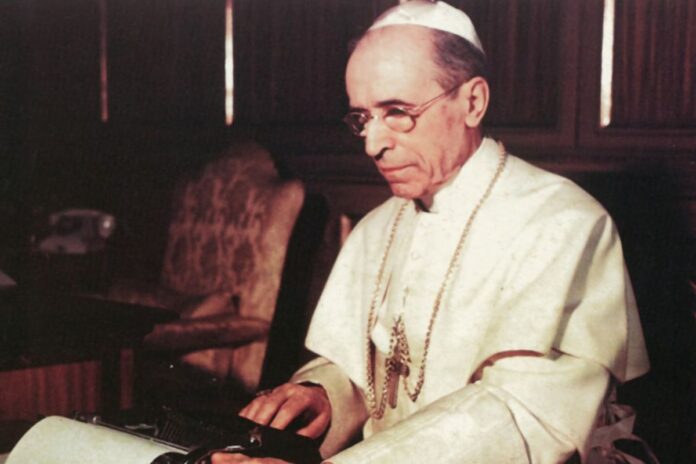Pope Pius XII, born Eugenio Maria Giuseppe Giovanni Pacelli (2 March 1876 – 9 October 1958), served as the head of the Catholic Church and sovereign of Vatican City from 1939 until his death in 1958. Before becoming pope, Pacelli held various key positions within the Church, including serving as the secretary of the Department of Extraordinary Ecclesiastical Affairs, papal nuncio to Germany, and Cardinal Secretary of State. In these roles, he was instrumental in negotiating significant treaties, including the Reichskonkordat with Nazi Germany in 1933, which aimed to protect the rights of the Catholic Church under Adolf Hitler’s regime.
Introduction
Pope Pius XII remains one of the most discussed and debated figures in modern Church history. Leading the Catholic Church from 1939 until his death in 1958, his papacy was defined by significant challenges, including the outbreak of World War II. Known for his diplomatic efforts and cautious public stance, his leadership during the war continues to spark controversy. In this article, we’ll explore Pope Pius XII’s legacy, the controversies that surrounded him, and the impact of his decisions during one of the most turbulent times in history.
Early Life and Papacy
The Rise of Eugenio Pacelli
Before becoming Pope Pius XII, Eugenio Pacelli had an extensive career in the Vatican. Born in Rome in 1876, he was educated by the Jesuits and entered the seminary at a young age. His early career as a diplomat and Vatican representative in Germany helped him gain recognition within the Church.
In 1939, Pacelli was elected Pope, taking the name Pius XII. His papacy began under dire circumstances—World War II was on the horizon, and the Catholic Church faced significant pressures both politically and morally.
Pius XII’s Early Papacy
Pius XII’s leadership was immediately tested by the outbreak of war. His diplomatic background led him to approach the conflict with caution, aiming to maintain neutrality while also advocating for peace. Despite being criticized for not speaking out strongly against Nazi atrocities, Pius XII’s supporters argue that his diplomatic efforts behind the scenes helped save thousands of lives, particularly in Italy and across Europe.
Leadership During World War II
A Delicate Balance
Pope Pius XII’s approach during WWII was marked by diplomacy and neutrality. He understood the delicate position the Church was in during the rise of fascism, communism, and the Nazi regime. While remaining publicly neutral, he worked behind the scenes to help Jews and others persecuted by the Nazis, often through the Church’s extensive network of clergy and institutions.
- Saving Lives: Many historians argue that Pius XII’s covert efforts saved thousands of Jews. The Vatican provided refuge in convents and monasteries, and many Catholic leaders in Italy openly defied the Nazis. Some estimates suggest that the Vatican helped shelter around 400,000 Jews during the war.
- Controversial Silence: However, his failure to publicly condemn Hitler and Nazi actions has been a source of ongoing debate. Critics argue that his silence could have emboldened the Nazis, while others suggest that any outspoken opposition could have led to devastating consequences for Catholics in Europe.
The “Holocaust Controversy”
One of the most enduring controversies surrounding Pope Pius XII’s papacy is his role during the Holocaust. Some scholars assert that his actions were insufficient to address the magnitude of Nazi atrocities. On the other hand, others maintain that his efforts to protect Jews and negotiate peace were a necessary, albeit quiet, form of resistance.
While Pius XII did not publicly denounce the Holocaust in a forceful manner, many documents from the era indicate that the Vatican did take significant steps to protect Jewish individuals and oppose Nazi policies.
Post-War Contributions and Challenges
Reconstruction of Europe
After the war, Pope Pius XII turned his attention to rebuilding the Church and Europe. He was instrumental in revitalizing Catholic influence in Europe post-WWII. His support for education, the arts, and social welfare programs helped position the Catholic Church as a key player in Europe’s recovery.
Relationships with Political Leaders
Pius XII also navigated the complex political landscape during the Cold War. His efforts to maintain independence from both Soviet Communism and Western secularism were crucial in shaping the Church’s role during the mid-20th century. He also worked to strengthen the Vatican’s relationships with Italy, the United States, and other key nations.
The Legacy of Pope Pius XII
Pope Pius XII’s legacy is one of complexity. He is often seen as a man caught between the moral imperatives of his faith and the political realities of his time. His supporters argue that his behind-the-scenes diplomacy was crucial in protecting countless lives, while his critics believe that his silence during the war was a failure to speak out against evil.
In recent years, there has been a renewed focus on his actions during World War II, with some calling for his canonization. Whether you view Pius XII as a defender of peace or a man who failed to speak boldly against injustice, his legacy remains an essential chapter in the history of the Catholic Church.
Frequently Asked Questions (FAQ)
Q1: Why was Pope Pius XII so controversial during WWII?
A1: Pope Pius XII’s controversial reputation stems from his failure to publicly denounce Nazi atrocities. While some argue he secretly worked to save lives, others criticize his silence, suggesting that it allowed Nazi actions to continue unchecked.
Q2: Did Pope Pius XII help Jews during the Holocaust?
A2: Yes, despite criticisms of his public stance, there is evidence that Pope Pius XII and the Vatican helped save thousands of Jews during the Holocaust by providing shelter and using the Church’s networks to protect them from the Nazis.
Q3: What were Pope Pius XII’s main contributions after WWII?
A3: After the war, Pope Pius XII focused on rebuilding the Church and Europe. He also worked to strengthen the Catholic Church’s position in the post-war world, promoting education, welfare, and social programs.
Q4: Was Pope Pius XII ever canonized?
A4: Pope Pius XII has not been canonized, and his cause for sainthood has been delayed due to ongoing controversies over his actions during WWII. His beatification process remains under review.
Wrapping Up: The Complex Legacy of Pope Pius XII
Pope Pius XII’s papacy is undeniably one of the most significant—and controversial—in modern Catholic history. His diplomatic efforts during WWII, his leadership after the war, and his role in the Holocaust continue to provoke discussion. While his legacy is still debated, it is clear that Pope Pius XII’s impact on the Catholic Church and world history is profound and lasting.
For those seeking a deeper understanding of Pius XII’s contributions and challenges, it’s essential to look beyond the controversies and examine the context of his decisions. Whether seen as a defender of peace or as a leader who failed to act boldly, Pope Pius XII’s papacy is a vital chapter in the ongoing story of the Catholic Church.




